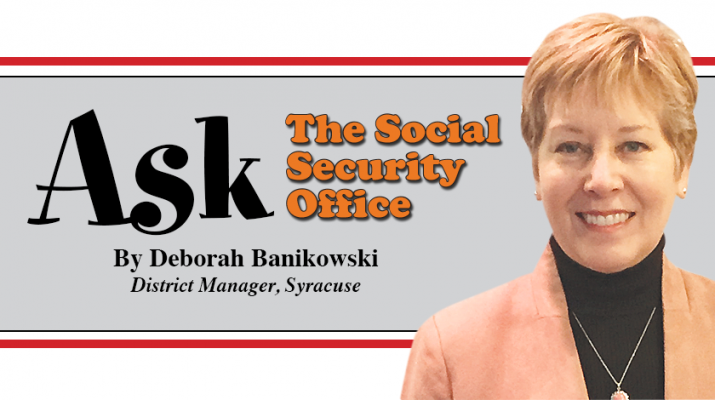By Deborah Banikowski
District Manager, Syracuse
You work hard for your money. You’re saving and planning for a secure retirement. Now you need to make sure you’re going to get all the money you deserve. Regularly reviewing your Social Security earnings record can really pay off, especially when every dollar counts in retirement.
If an employer did not properly report just one year of your work earnings to us, your future benefit payments from Social Security could be close to $100 per month less than they should be. Over the course of a lifetime, that could cost you tens of thousands of dollars in retirement or other benefits to which you are entitled. Sooner is definitely better when it comes to identifying and reporting problems with your earnings record. As time passes, you may no longer have easy access to past tax documents, and some employers may no longer be in business or able to provide past payroll information.
It’s ultimately the responsibility of your employers — past and present — to provide accurate earnings information to Social Security so you get credit for the contributions you’ve made through payroll taxes. But you can inform us of any errors or omissions. You’re the only person who can look at your lifetime earnings record and verify that it’s complete and correct.
So, what’s the easiest and most efficient way to validate your earnings record?
• Visit www.socialsecurity.gov/myaccount to set up or sign in to your own my Social Security account;
• Under the “My Home” tab, select “Earnings Record” to view your online Social Security Statement and taxed Social Security earnings;
• Carefully review each year of listed earnings and use your own records, such as W-2s and tax returns, to confirm them;
• Keep in mind that earnings from this year and last year may not be listed yet; and
• Notify us right away if you spot errors by calling 1-800-772-1213.
More detailed instructions on how to correct your Social Security earnings record can be found at www.socialsecurity.gov/pubs/EN-05-10081.pdf.
Securing today and tomorrow requires accuracy and diligence on our part and yours. You’ll be counting on Social Security when you reach retirement age. Make sure you’re getting every dollar you’ve earned. You can access us any time at www.socialsecurity.gov.
Q&A
Q: What is the earliest age that I can receive Social Security disability benefits?
A: There is no minimum age as long as you meet the Social Security definition of disabled and you have sufficient work to qualify for benefits. To qualify for disability benefits, you must have worked under Social Security long enough to earn the required number of work credits and some of the work must be recent. You can earn up to a maximum of four work credits each year. The number of work credits you need for disability benefits depends on the age you become disabled. For example, if you are under age 24, you may qualify with as little as six credits of coverage. But people disabled at age 31 or older generally need between 20 and 40 credits to qualify, and some of the work must have been recent. For example, you may need to have worked five out of the past 10 years. Learn more at www.socialsecurity.gov/disability.
Q: What is substantial gainful activity (SGA)?
A: We use the term “substantial gainful activity,” or “SGA,” to describe a level of work activity and earnings. Work is “substantial” if it involves doing significant physical or mental activities or a combination of both.
If you earn more than a certain amount and are doing productive work, we generally consider that you are engaging in SGA. For example, the monthly SGA amount for 2018 is $1,180. For statutorily blind individuals, that amount is $1,970. In these cases, you would not be eligible for disability benefits if you made over those amounts. You can read more about substantial gainful activity and if your earnings qualify as SGA at www.socialsecurity.gov/oact/cola/sga.html.
Q: I’m trying to figure out how much I need to save for my retirement. Does the government offer any help with financial education?
A: Yes. For starters, you may want to find out what you can expect from Social Security with a visit to Social Security’s Retirement Estimator at www.socialsecurity.gov/estimator. The Financial Literacy and Education Commission has a website that can help you with the basics of financial education: www.mymoney.gov. Finally, you’ll want to check out the Consumer Financial Protection Bureau, which offers educational information on a number of financial matters, including mortgages, credit cards, retirement, and other big decisions. Visit the Consumer Financial Protection Bureau at www.consumerfinance.gov.

